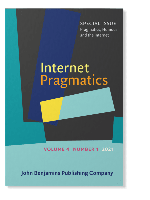
Internet Pragmatics
Scope & Guideline
Illuminating the Dynamics of Digital Discourse
Introduction
Aims and Scopes
- Multimodal Communication:
Explores how various modes of communication (text, images, emojis, etc.) interact in online contexts, emphasizing the complexity of meaning-making in digital interactions. - Social Interaction and Identity:
Investigates how online communication shapes social actions and identities, examining the role of language in constructing and negotiating identities in digital spaces. - Hate Speech and Online Behavior:
Analyzes the discourse surrounding hate speech, its implications for social dynamics, and strategies for countering harmful language in online settings. - Cognitive and Emotional Aspects of Communication:
Studies the psychological and emotional responses elicited by online communication, focusing on how language influences perceptions and interactions. - Pragmatics in Digital Contexts:
Focuses on the application of pragmatic theories to understand language use in various digital contexts, including social media, gaming, and online communities.
Trending and Emerging
- Multimodal Interaction:
The focus on multimodal communication strategies is increasing, reflecting the complexity of how users engage through various modes (text, images, emojis) in online interactions. - Hate Speech and Online Activism:
There is a rising interest in examining hate speech as a social phenomenon, particularly how it manifests in digital spaces and the strategies employed to combat it, suggesting a heightened relevance of this topic. - Informality and User Generated Content:
The exploration of informality in user-generated content is trending, with researchers examining how informal language shapes interactions and community dynamics in various digital contexts. - Identity Construction in Digital Spaces:
Emerging studies are focusing on how individuals construct and negotiate their identities in online environments, reflecting the importance of digital identity in contemporary social interactions. - Emotional and Cognitive Responses:
A growing trend involves studying the emotional and cognitive effects of online communication, particularly how language influences user engagement and community building.
Declining or Waning
- Traditional Language Studies:
Research that strictly adheres to traditional linguistic frameworks without integrating modern digital contexts appears to be declining, as the journal increasingly emphasizes the need for interdisciplinary approaches. - Formal Language Use:
There is a noticeable decrease in studies focusing solely on formal language use in online communication, with a shift towards understanding the nuances of informality and multimodality. - Static Analysis of Humor:
The analysis of humor as a static phenomenon is waning; instead, the journal is moving towards dynamic and contextual interpretations of humor in digital interactions. - Narrow Cultural Studies:
Papers that focus solely on specific cultural contexts without connecting to broader digital communication trends are appearing less frequently, indicating a preference for more integrative studies. - Single-Platform Studies:
The analysis of interactions on single platforms (e.g., only Facebook or only Twitter) is declining, as the journal seeks to explore cross-platform interactions and their implications.
Similar Journals

Linguistic Research
Fostering Scholarly Dialogue in Linguistic StudiesLinguistic Research, published by the Kyung Hee University Institute for Study of Language & Information, stands as a prominent platform within the field of linguistics and language studies. With an ISSN of 1229-1374, this journal has gained recognition for its contributions to theoretical and empirical research since its inception in 2014. Ranked in the Q2 category of linguistics and language in 2023, it has established its presence in prestigious databases like Scopus, where it ranks #404 in Arts and Humanities and #479 in Social Sciences. The journal actively encourages scholarly discussion and innovation, providing a crucial venue for researchers, professionals, and students to disseminate their findings and engage in the evolving conversation around language. Despite not being open access, Linguistic Research is pivotal for those seeking comprehensive insights and advancements in linguistic studies, making it an essential resource for anyone passionate about the dynamics of language and communication.
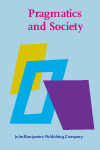
Pragmatics and Society
Advancing Understanding through Language UsePragmatics and Society, published by John Benjamins Publishing Co, is an esteemed journal that serves as a vital platform for the interdisciplinary exploration of language use in social contexts. Established with the aim of bridging the gap between pragmatics and social theory, this journal covers innovative research and critical methodologies within linguistics and language studies. With an impressive impact factor and recognition as a Q2 journal in the field of Linguistics and Language for 2023, it ranks notably within the 75th percentile for Arts and Humanities and 73rd for Social Sciences. Based in the Netherlands, Pragmatics and Society is dedicated to fostering scholarly discussions and advancing knowledge in areas such as discourse analysis, sociolinguistics, and communicative practices. Researchers, professionals, and students alike will find this journal to be an invaluable resource for understanding the complexities of language in society and are encouraged to engage with its rigorous publications.
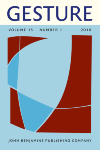
Gesture
Bridging the gap between gesture and linguistic expression.Gesture, published by JOHN BENJAMINS PUBLISHING CO, is a leading interdisciplinary journal that focuses on the study of human gestural communication as a rich field for linguistic and cognitive research. With an ISSN of 1568-1475 and an E-ISSN of 1569-9773, the journal has been influential since its inception in 2001, providing a vital forum for researchers and professionals studying the interplay between gesture and language. It significantly contributes to various academic fields, evidenced by its remarkable rankings, including Q1 in Cultural Studies and Q2 in Linguistics and Language as of 2023. While it does not offer Open Access, its high impact in scholarly communication makes it indispensable for anyone wanting to explore the nuances of non-verbal expression. The journal maintains a dynamic scope, converging scholarship from 2001 to 2014 and continuing robustly from 2016 to 2024, solidifying its position in the social sciences sector, particularly in the realms of communication, cultural studies, and cognitive psychology. Gesture is published from the Netherlands, and its esteemed reputation ensures that it attracts contributions from top-tier researchers worldwide, making it a crucial resource for advancing knowledge and understanding in the field.

Fluminensia
Cultivating Critical Discourse in the HumanitiesFluminensia, published by the University of Rijeka, Faculty of Philosophy, is a distinguished open-access journal that has been contributing to the fields of Linguistics and Literature since its inception in 1999. With an ISSN of 0353-4642 and an E-ISSN of 1848-9680, this journal offers rigorous peer-reviewed articles, fostering an engaging platform for researchers, professionals, and students alike. Recognized internationally, it holds a Q3 ranking in Linguistics and Language and a Q2 ranking in Literature and Literary Theory for 2023, reflecting its significant impact within these fields. Based in Croatia and serving a global academic community, Fluminensia aims to explore innovative theories and methodologies, promoting critical discourse and scholarly exchange. Researchers will find its broad scope inviting, bridging insights across various disciplines in the arts and humanities. Accessible to all, this journal continues to foster an inclusive academic landscape, ensuring that valuable research is widely disseminated and freely available.
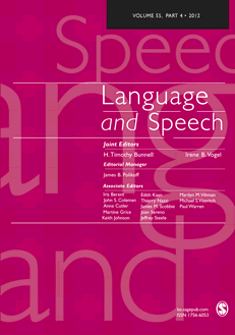
LANGUAGE AND SPEECH
Championing High-Impact Research in Speech and LinguisticsLANGUAGE AND SPEECH, published by SAGE PUBLICATIONS LTD, is a premier journal that serves the multifaceted realms of linguistics, speech science, and sociology. With a robust history of scholarly contribution since 1958 and an anticipated continuation through to 2024, the journal is recognized for its high-impact research, boasting a commendable impact factor and achieving Q1 ranking in both Linguistics and Sociology as well as Q2 in Medicine and Speech and Hearing categories as of 2023. The journal, available in both print and online formats with ISSN 0023-8309 and E-ISSN 1756-6053, provides a vital platform for interdisciplinary discourse among researchers, professionals, and students alike. Its rigorous review process and quality publications place it at the forefront of academic inquiry, offering critical insights that advance the understanding of language and its implications in various contexts. As a key resource in the field, LANGUAGE AND SPEECH continues to foster innovation and knowledge dissemination, making it an essential addition to the libraries of those committed to exploring the depths of communication sciences.
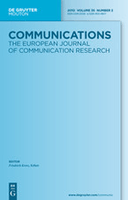
Communications-European Journal of Communication Research
Elevating Discourse in the Field of CommunicationCommunications-European Journal of Communication Research is a premier journal published by DE GRUYTER MOUTON, dedicated to fostering scholarly discourse in the field of communication studies. With a publication history spanning over four decades, from 1976 through to 2024, this journal serves as a vital resource for researchers and practitioners interested in the latest advancements and theoretical developments in communication. The journal is recognized for its rigorous peer-review process and has earned a commendable reputation, evidenced by its ranking in the Q2 quartile in both Arts and Humanities (miscellaneous) and Communication categories for 2023. Its Scopus rankings signify its relevance and impact, positioning it within the top quartile of the discipline's literature. Although not an open access journal, it provides access to a wide range of research that contributes significantly to the understanding of communication practices across diverse contexts. Scholars, professionals, and students alike will find a wealth of knowledge that not only sharpens their academic pursuits but also enriches practical applications in the communication landscape.
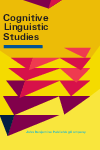
Cognitive Linguistic Studies
Pioneering Research at the Intersection of Language and CognitionCognitive Linguistic Studies is a prestigious journal published by JOHN BENJAMINS PUBLISHING CO, dedicated to advancing the interdisciplinary field of cognitive linguistics. With an ISSN of 2213-8722 and an E-ISSN of 2213-8730, the journal serves as an essential platform for the dissemination of high-quality research that delves into the intricate relationships between language, thought, and cultural contexts. Located in the vibrant academic milieu of the Netherlands, this journal has gained recognition for its impactful contributions, reflected in its respectable Q2 category ranking within the field of Linguistics and Language as of 2023. Redesigned to accommodate a broader audience, the journal welcomes original research articles, reviews, and theoretical discussions that bridge cognitive science and linguistic inquiry. As the journal continues its trajectory of growth, being indexed with a solid Scopus rank of #459 out of 1167 in the social sciences, it remains a vital resource for researchers, professionals, and students eager to explore the dynamic interplay between cognition and language.

Intercultural Pragmatics
Connecting Cultures One Interaction at a Time.Intercultural Pragmatics, published by De Gruyter Mouton in Germany, stands at the forefront of the study of communication across diverse cultures, bridging the gap between linguistic theory and real-world intercultural exchanges. With an ISSN of 1612-295X and an E-ISSN of 1613-365X, this esteemed journal has been contributing to the field since its inception in 2004, showcasing rigorous scholarship through its convergence of literature up to 2024. The journal enjoys a commendable reputation, positioned in the Q2 quartile of Communication and the Q1 quartile of Linguistics and Language, reflecting its significant impact within the academic community. As recognized in Scopus rankings, it is ranked #122 out of 1088 in Arts and Humanities (Language and Linguistics) and holds an impressive 88th percentile, making it an essential resource for researchers, professionals, and students eager to deepen their understanding of intercultural dynamics. While access options remain standard, the journal prioritizes groundbreaking insights and theoretical advancements that contribute to the ever-evolving landscape of linguistics and intercultural communication.

Functions of Language
Empowering Language Studies Through Rigorous ResearchFunctions of Language, published by John Benjamins Publishing Co, serves as a vital platform for scholars and practitioners in the fields of linguistics and language studies. With its ISSN 0929-998X and E-ISSN 1569-9765, this esteemed journal, based in the Netherlands, has solidified its reputation through a focused dedication to exploring the multifaceted roles that language plays across various contexts. Ranked in the top percentile of leading journals in Linguistics and Language (Q2 category, 2023) and holding impressive Scopus ranks within both the Arts and Humanities and Social Sciences sectors, the journal emphasizes research that interlinks theoretical insights with practical implications. Functions of Language aims to advance our understanding of linguistic structures and their applications, making it an essential resource for researchers, professionals, and students alike who are eager to contribute to the evolving discourse in language studies. With content converging from 1994 to 2024, the journal reflects ongoing scholarly engagement and innovation in the field.
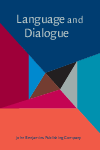
Language and Dialogue
Bridging Disciplines through Language and DialogueLanguage and Dialogue is an esteemed journal published by JOHN BENJAMINS PUBLISHING CO, focusing on the interdisciplinary intersections of language use, cultural studies, and literary theory. With an ISSN of 2210-4119 and an E-ISSN of 2210-4127, the journal has established itself as a prominent platform for high-quality research since its inception in 2011. Notably, it is ranked Q1 in Cultural Studies and Literature and Literary Theory, reflecting its prestigious standing in these fields, and has impressive Scopus rankings that further underline its scholarly impact within the arts and humanities. Based in the Netherlands, Language and Dialogue is committed to advancing the understanding of dialogue's role in language and communication, providing a vital resource for researchers, professionals, and students alike. Although not an Open Access journal, it ensures access to cutting-edge research through institutional subscriptions, making it an essential addition to any academic collection in the humanities and social sciences.